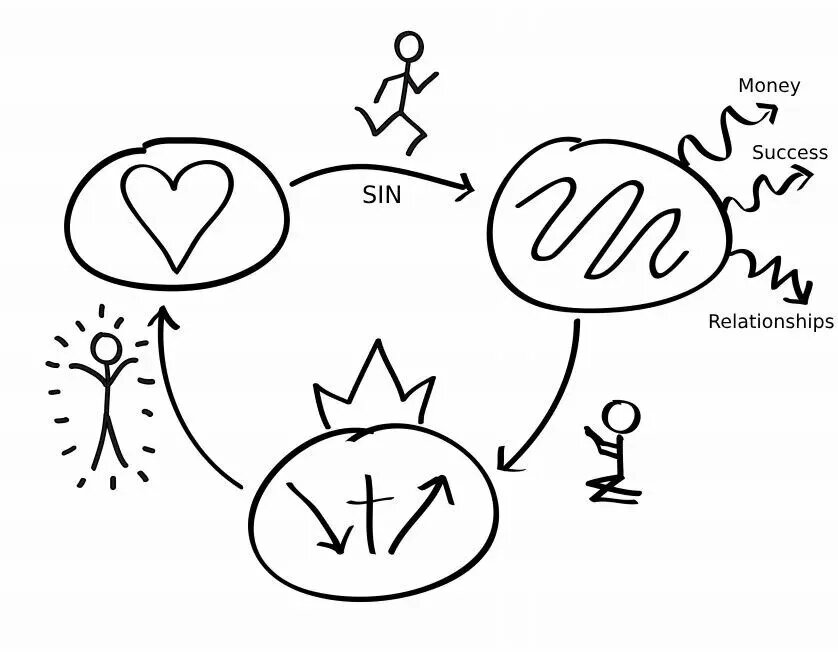Living With Purpose – Part 2 – Spanish
Living With Purpose – Part 2 – Arabic
Living With Purpose – Part 2 – Hindi
Transcript: Part 2 (Living with a Purpose):
In the next parts, we are going to learn some effective tools that we can use when sharing about Christ (peace be upon him). He lived a perfect life without sin and showed us how to defeat sin and death so we can return to paradise after we die. If we accept Him into our lives, we will be able to regain our original design, just as it was in the Garden of Eden.
Contextualization in Our Language When Sharing with Our Cousins:
If you look around you in our Christian community, you will find that we have created our own language over many years. What I often observe is that it’s really hard to approach our cousins with this language, so we are changing it to simplify everything.
Paul said that they need milk as children in their faith. After that, we will lead them step by step, and here is a Bible reference for this idea:
- Philippians 2:1-11: When you read this, I want you to notice how God humbled Himself to reach out to us, and He spoke our language.
- 1 Corinthians 3:1-2: We can also see how Paul, after being a very radical Jew, became a very humble person who said, “I became everything to share the Gospel,” and he laid down his rights!
- Acts 17:16: This is a very important moment when Paul decided to approach them through one of the things they liked at the time to get their attention.
Now, I’m going to share some words. It’s always amazing when we say them, as they fit their faith and are not against our Bible:
- Jesus — Eissa or Christ (peace be upon him). Just in case you don’t know, Eissa is closer to His original name in Greek, Jesus.
- (ASLELK) in Arabic means “I want to pray for you.” We change it to (ada’elk) (أدعيك).
- We don’t say, “God told me” or “Eissa told me.” We say, “God inspired me” (ألهمني).
- Every time we speak about the prophets, especially for Arabic speakers, we must say, Peace be upon [Prophet’s Name].
- We don’t use deep words in prayers. For example, don’t say “Abba Father,” “Our Heavenly Father,” or “God, take Ahmed in front of the throne,” or anything like that, because we want them to understand and repeat the prayers again (multiplication).
Tools:
Before I share with you some tools that we can use, I want to explain that you will always find three types of people. To help you determine which type they are, and to ensure all of this by God’s grace and wisdom within you, it’s not your sensor, but His! He will lead you.
First Type: Red Light People
These are people who tell you, “No, we don’t want to speak about these topics,” or mock the things you say, or curse. This type is very rare as long as you are wise in sharing and loving them.
My advice with these people is to just shake the dust from our feet, love them, and pray for them that God will soften their hearts so they will be able to listen to us and follow the Lord.
Second Type: Yellow Light People
These are people you will find most often, who have questions without finding answers, or they have misconceptions about many topics in Christianity. In Egypt, I believe they received wrong answers from Muslim sheikhs (Muslim preachers), so it will always be amazing if we can fix their mindsets about things in Christianity.
First Tool and the Most Used: Unconditional Love
After many years of sharing with Muslims, I have found that sometimes we don’t need to share deep things, and we don’t need to share theological concepts with people on the street, like the homeless or those who have lost hope. I have found that if you just give them love by listening to them and accepting them, no matter how they smell or how dangerous they appear, they just need people to love them unconditionally, as God loved us all—even when we didn’t deserve it. We were all dangerous under sin, but He redeemed us, and we did nothing to earn His love.
Second Tool: For Educated People or Those Who Like to Think
This tool is more for educated people or those who like to think and ask deep questions. In this tool, we will speak about many things and topics we can use when sharing with the majority.
The first one, if you want to share the Gospel, we call it The 3 Circles:
Before we share this tool, we try to find a door or an entry to get to this topic. One of the things I have used many times is discussing the financial situation and the broken world we live in right now, and how that wasn’t God’s desire from the beginning. So we shift to the beginning when God created the world, Adam, and Eve. We were living in paradise and they were going to live forever—no sickness, no brokenness, no cheating, and no sin. But humans (Adam and Eve) decided to disobey God with their own free will, and now we live in a broken world.
But God had a different plan from the beginning, because He already knew what would happen, and it shows how He loves us. He took the 99 steps to restore us, revealing Himself through Christ. He died and resurrected, defeating sin, so He could restore us to the way the relationship was in paradise.
So the summary is:

- God created the world perfect, and He was with us in paradise.
- Humans chose to disobey God, and evil entered the world.
- God knew all this would happen, but He was planning a bigger plan, which we can name God’s love.
Third Tool: Quick Testimony
This tool is powerful, especially if we don’t have much time and only have 2 or 3 minutes. It works like a hook to see if the person is interested in learning more or not!
How? Simply, pick 2 words to describe your old life before recognizing the meaning of redemption, for example:
- Alone
- Useless
Now, describe your life after understanding redemption, for example:
- Not feeling alone
- Helpful person
I will share mine as a clearer example:
“There was a time in my life when I was living in loneliness and depression. But when I accepted what Christ did for me, it showed me how God loved us and proved this to me. Now, I am living in fulfillment and joy.”
Most of the time, when I share this, they say, “Wow! How can we have joy? How can we live this way?!” This is what opens the conversation, so we can create good soil to share about Jesus. By His grace, they will follow Him and accept Him as their personal Savior.

Leave a Reply